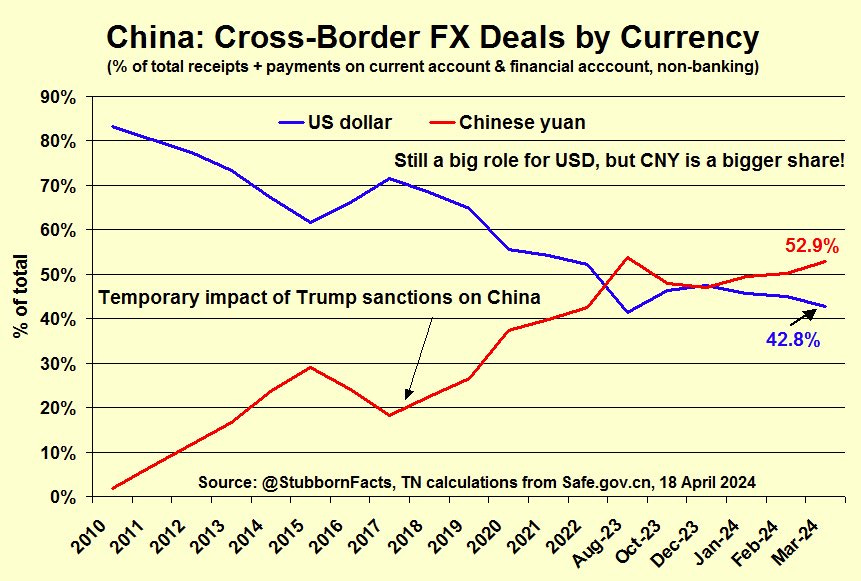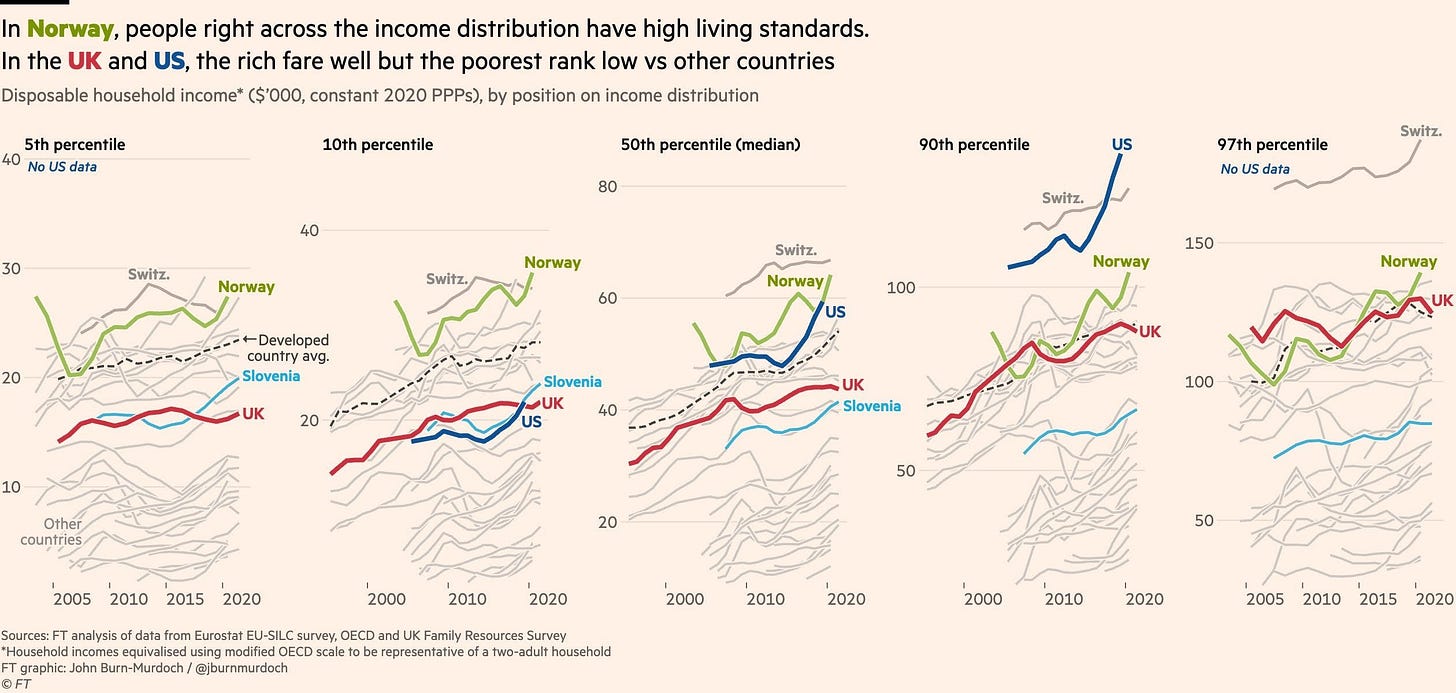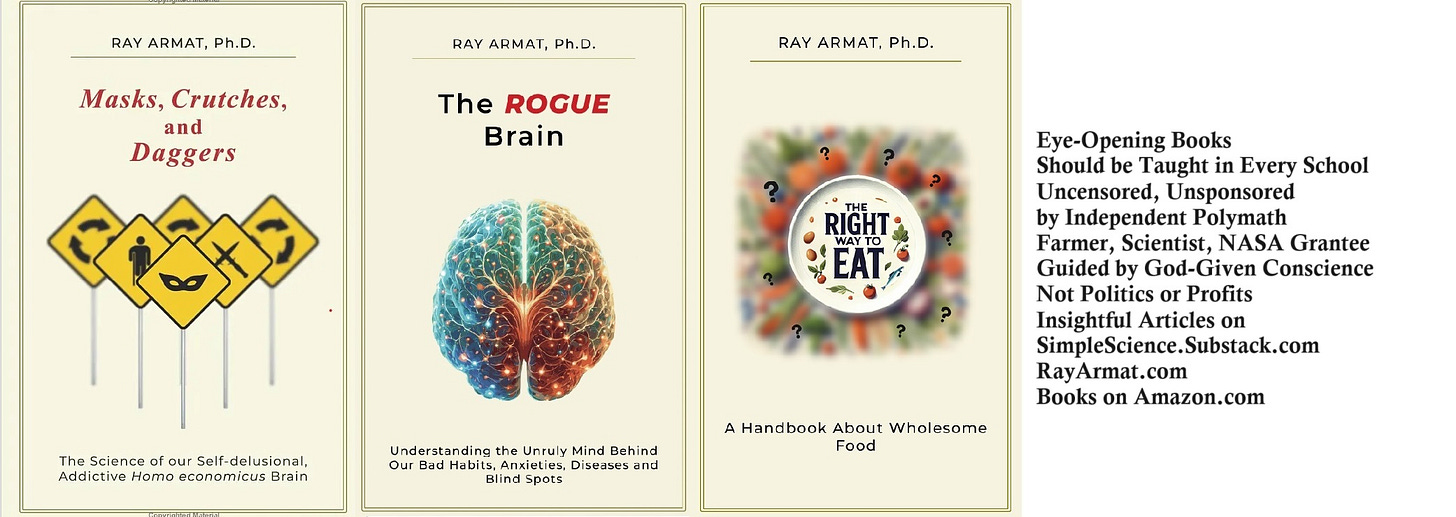The Link Between China's Currency, Daycares in America, Gen Z Depression, Suicides and Shorter Lifespans
Sometimes I am asked by friends or followers on Twitter or Substack on the common theme in my books connecting economy, behavioral psychology, neuroscience, food science, farming, etc.? Here is an example of how I see the world as one big connected system. Here are some recent trends I have been following:
The transition of the BRICS block, and especially China and Russia, away from US dollar as the primary global exchange and trade currency. For example, since 2023, more than half of China’s FX (foreign exchange) transactions are no longer in US dollar. In my articles, interviews and books, have already predicted this dissociation of the world economies (reverse of globalization) into smaller blocks.
Another economic trend and pattern in the world, is the widening income gap between the poor and the rich. This seems to be happening at an exponential or accelerating pace especially in free market economies like America and Switzerland, as clearly shown in the chart below:
Inside the US, there seems to be a widening gap in the attitudes and psychographics of different generations. Somehow, starting in 2014, there seems to be an exponential growth in the depressive, suicidal thoughts and mental illness in teenagers. What happened exactly in 2014? Why the exponential spike in teenage depression starting in 2014?🤔 What does this trend have to do with China’s foreign currency exchanges and income disparity in societies? Read on …
Another interesting trend in the world, especially in America, is the exponentially growth in the percentage of children raised in daycares and not at home by their own parents. It is common to see a large flock of children circling on pavements around city blocks, leashed to a rope, while their parents are at work. Some Democrat politicians are now promising American parents with government (tax)-funded support for daycare expenses.
There seems to be an alarming shift in people’s attitude in America. Generation Z (born after 1998) has a lot less faith in god, country and family than their parents’ or grandparents’ generation did. Why this widening gap and cultural dissociation between the parents’ and children generations?
Data analysts on twitter have shown that mortality rates are bottoming out and humans may actually be living shorter lives going ahead. What is beyond this trend? It did not start with the 2020 pandemic. It looks like 2014 was the low point (like No. 3 above).
My Take
I am not trying to promote my books (available on Amazon) here but reading them is the best way to gain a deep insight into how the human psyche, biology, economy, brain and food are all interrelated. Here is my short take on connecting all the trends above:
Our economies are nothing but exchange of products. Our cultures are nothing but exchange of ideas. The brain of modern humans (which I call Homo economicus in my books) values nothing more than the “economic utility of their personal time.” In other words, if I can make $35 an hour as a nurse, and daycare costs me only $15 an hour, I can maximize the utility of my time (net of $35-$15=$20 an hour) by working during the day and dropping off my child in a daycare. I explain in my books how “specialization” of labor was a key for our brains to think this way. So one person becomes a specialist in nursing and another a daycare laborer, while both of them maximize the “economic” utility of their unit time (life) which is one hour.
But then husbands and wives each try to maximize their own economic utility individually. If the wife has to work 10 miles away and the husband 30 miles away to reach their maximum economic utility, each morning they go their own separate ways, sometimes miles apart, in their own cars, and drop off the child in a facility miles away from both of them. Individuals, families, nations each learn how to go their “own way” to find the best way to maximize the “economic” value of their time. This maximizing utility and specialization of labor may look good at first but it leads to competitiveness and dissociation of social units. Widening income gaps are a natural outcome of an overly competitive game (of economy), the same way new records are being broken each year in the Olympics by individually-driven supercompetitive rivals. We are all rivals to each other now and willing warriors in the global arena of economic gladiators. We are all indirectly and unknowingly competitors and comparers in this game of maximizing dollar value for our time. As explained in my books, the hormones and neuropeptides released in our body in times of competition (dopamine, cortisol, testosterone) dry up and deplete neuropeptides released in times of trust and relaxation (oxytocin and serotonin). Modern humans are born into endless competition in competitive job markets, without much time to develop deep trusting bonds with each other.
This mindset of maximizing economic utility permeates from individuals to nations. If China can generate more revenue by switching to their own currency in international trade, they would. The US dollar would reign as the global currency as long as the world TRUSTED in the issuer of the note, i.e., the US government. Humans are increasingly metamorphosing to Homo economicus, not trusting anything except their own income per unit time.
Competitors do not have to be loyal or honest to each other. The more we compete, the more masks we wear, the less we trust each other. The more husbands and wives feel in competition to maximize their individual income (per unit time), the more unstable the family becomes. This includes global families in trade. China and the US are divorcing (Chart 1), the same way the European Union is falling apart and so are many old relationships of trust and convenience.
Trust and collaboration are contagious but so are selfishness and competitiveness. An ancient Persian proverb says "A clay jug only leaks what's in it!" We can't expect our children emanate love and kindness when we fill their vessels (spiritual containers) with materialism (selfishness). Digital machines like phones are now baby sitting our children (when they come back from daycares). Gen Z is the 1st generation to grow up constantly online (away from nature/reality) to study, play, shop, work, date, think! Gen Z has the highest rate of mental illness.
We are getting sicker and unhealthier. The mortality rates (the ASMR chart 6 above) seems to be bottoming out and reversing a century-long trend because the denatured world of relentless deficit-driven expansion, built and blindly followed by Homo economicus, has sacrificed “resilience” for speed, “Quality” for Scale (quantity) and “imbalance” for Convenience!
Let’s spend more time on bonding and less on competing and making money. Let’s spend more time with our children in nature and teach/learn farming and gardening.🧑🌾 Perhaps the best gift for children is not more money brought in by the parents, or fun gadgets and toys, but parents' “time,” love, wisdom, mentoring, nature, good books, sunshine, good food, good health and peace. These cannot be bought by money or preaching (about God, family and country, see chart number 5).









